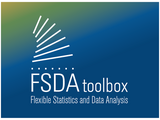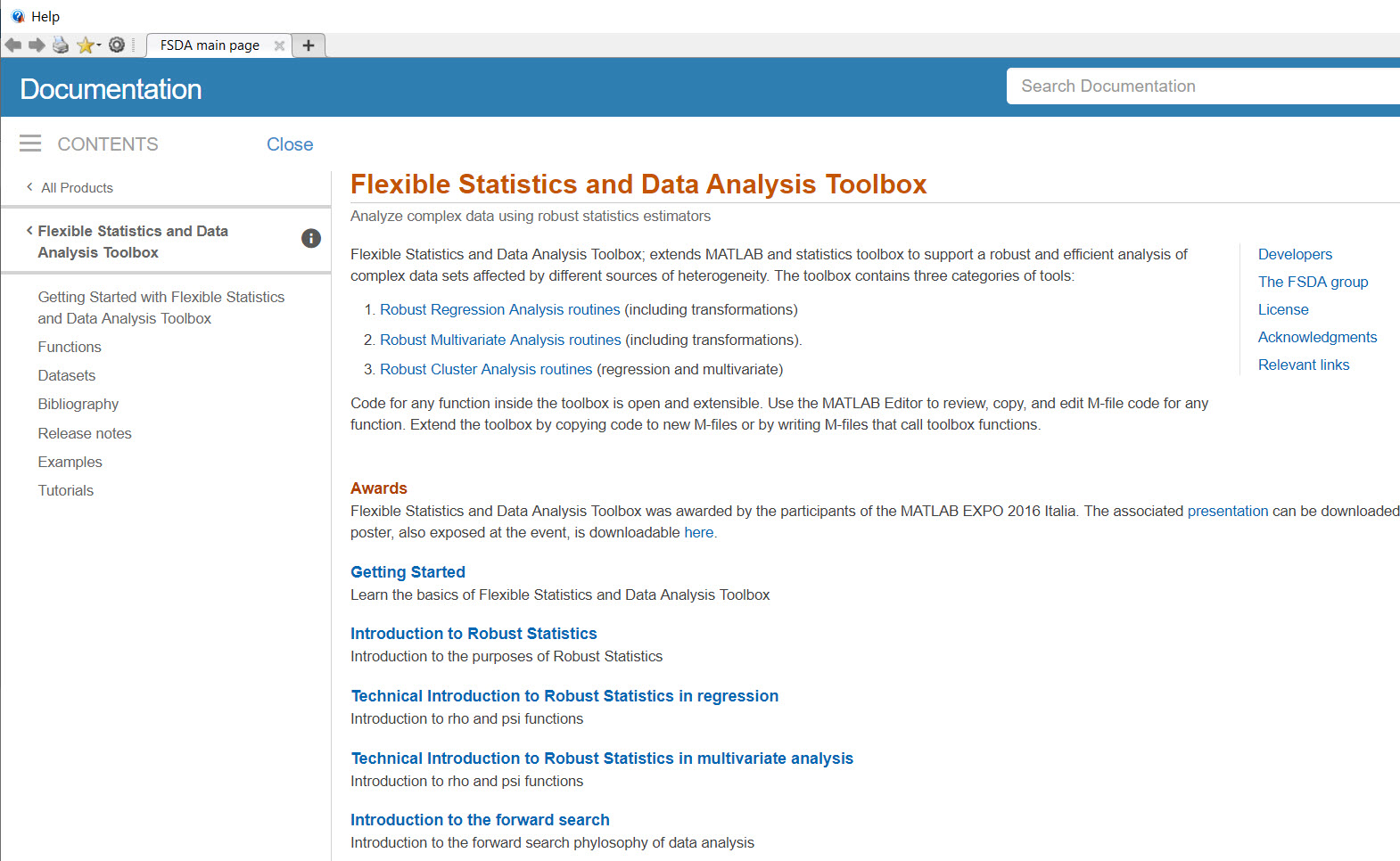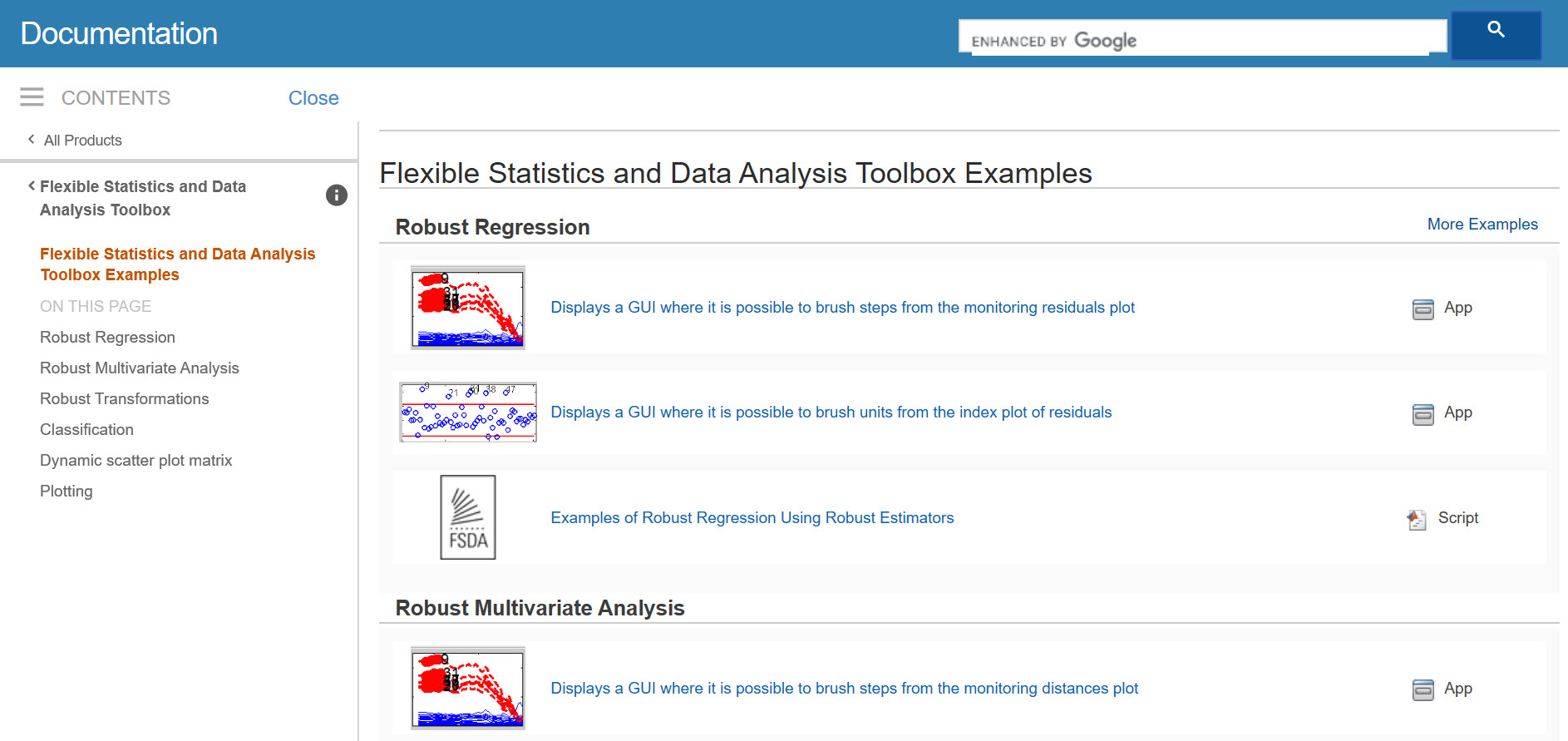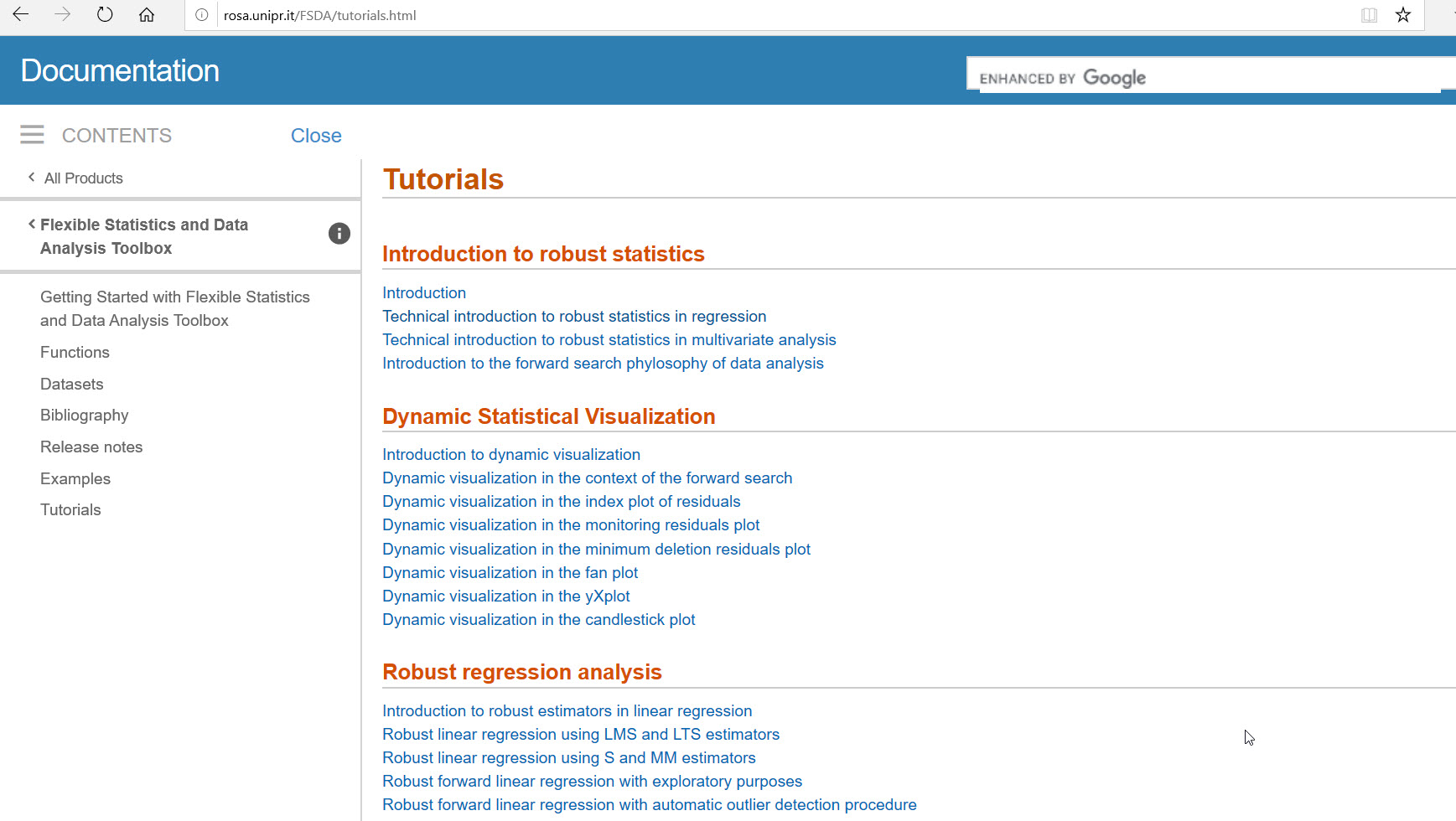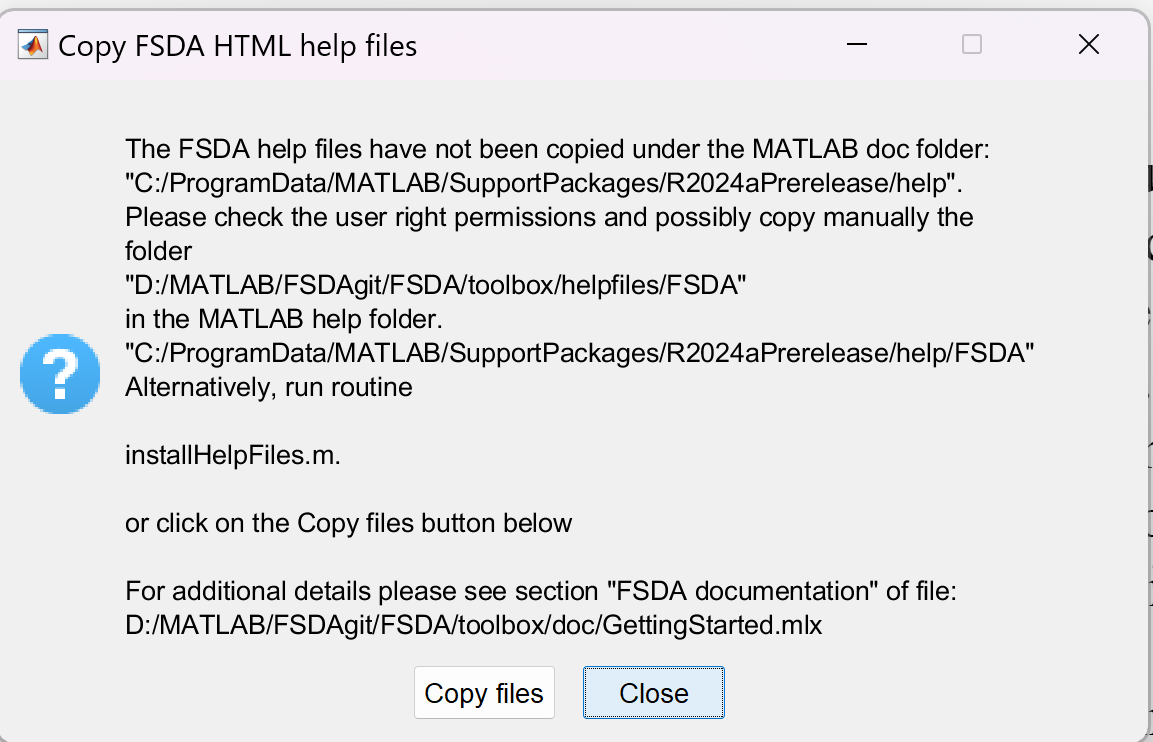FSDA - Flexible Statistics Data Analysis toolbox
- Now FSDA is compliant with MATLAB Toolbox Best Practices.
Thanks to the constant support of Rob Purser and Bensingh Pancras we were able to migrate the FSDA toolbox to the new structure which improves the toolbox's polish, ease of maintenance, and developer/user experience.
In addition to being more GitHub-friendly, being in the standard format allows for a number of additional features that we are now attempting to leverage, such as
namespacesandinternalfolders, among many other things. When a toolbox hits the 300 functions mark, it's time to do some housekeeping!
-
Now FSDA supports the new buildtool feature (follow the link for more info) to create new releases on GitHub automatically leveraging the sinergy of the new buildtool functionalities, (see an overview in the documentation, available since R2022b) MATLAB scripts and GitHub Actions. Releasing a new FSDA release was a manual, multi-step process, that involved a lot of tasks in different environments, now the process runs entirely on GitHub and is consistent and fast. (Our thanks goes to Jos Martin, Rob Purser, Bensingh Pancras, Andy Campbell, Mark Cafaro et. al. that supported us with the implementation of this new feature)
-
Now FSDA is also availble as a Docker (follow the link for more info) so if you need to run simulations on a HPC facility on Singularity/Apptainer or you just want to try FSDA with all the features you can follow this link and download a full fledged FSDA docker (yes it works also locally on WSL/WSL2!). Once a new release is created, a docker of FSDA is automatically build and can be easily pulled. (Our thanks go to Jos Martin that helped us a lot on this project).
This project hosts the source code to the original MATLAB FileExchange project and is place of active development.
FSDA Toolbox™ provides statisticians, engineers, scientists, researchers, financial analysts with a comprehensive set of tools to assess and understand their data. Flexible Statistics Data Analysis Toolbox™ software includes functions and interactive tools for analyzing and modeling data, learning and teaching statistics.
The Flexible Statistics Data Analysis Toolbox™ supports a set of routines to develop robust and efficient analysis of complex data sets (multivariate, regression, clustering, ...), ensuring an output unaffected by anomalies or deviations from model assumptions.
In addition, it offers a rich set interactive graphical tools which enable us to explore the connection in the various features of the different forward plots.
All Flexible Statistics Data Analysis Toolbox™ functions are written in the open MATLAB® language. This means that you can inspect the algorithms, modify the source code, and create your own custom functions.
For the details about the functions present in FSDA you can browse the categorial and alphabetical list of functions of the toolbox inside MATLAB (once FSDA is installed) or at the web addresses http://rosa.unipr.it/FSDA/function-cate.html and http://rosa.unipr.it/FSDA/function-alpha.html
- Is especially useful in detecting in data potential anomalies (outliers), even when they occur in groups. Can be used to identify sub-groups in heterogeneous data.
- Extends functionalities in key statistical domains requiring robust analysis (cluster analysis, discriminant analysis, model selection, data transformation).
- Integrates instruments for interactive data visualization and modern exploratory data analysis, designed to simplify the interpretation of the statistical results by the end user.
- Provides statisticians, engineers, scientists, financial analysts a comprehensive set of tools to assess and understand their data.
- Provides practitioners, students and teachers with functions and graphical tools for modeling complex data, learning and teaching statistics.
FSDA is developed for wide applicability. For its capacity to address problems focusing on anomalies in the data, it is expected that it will be used in applications such as anti-fraud, detection of computer network intrusions, e-commerce and credit cards frauds, customer and market segmentation, detection of spurious signals in data acquisition systems, in chemometrics (a wide field covering biochemistry, medicine, biology and chemical engineering), in issues related to the production of official statistics (e.g. imputation and data quality checks), and so on.
For more information see the Wiki page at https://github.com/UniprJRC/FSDA/wiki
-
Run the examples contained in files examples_regression.m or examples_multivariate.m or examples_categorical.m. Notice that all examples are organized in cells
-
Run the GUIs in the FSDA Matlab help pages. For a preview see http://rosa.unipr.it/FSDA/examples.html
-
Watch the videos in the Examples section of the FSDA Matlab help pages For a preview see http://rosa.unipr.it/fsda_video.html
-
Read section "Introduction to robust statistics" or "Technical introduction to Robust Statistics" in the FSDA Matlab help pages. For a preview see http://rosa.unipr.it/FSDA/tutorials.html
The installation procedure is fully automatic if FSDA is installed through Get Adds-Ons inside MATLAB.
The most critical part of the installation concerns the FSDA documentation system, which consists in a series of HTML files that follow the typical MATLAB style and are completely integrated inside the MATLAB documentation system.
The html help files can be found in the Supplemental Software tab** which appears at the bottom of the Doc Center home page (see screenshot below).
Similarl to what happens for the MATLAB documentation, the FSDA documentation is shown in a different way depending on the User Preferences.
Inside Preferences the Documentation Location is "Web".
In this case every time the user the user tries to access FSDA documentation it will be redirected to the appropriate page inside http://rosa.unipr.it/FSDA (of course in this case Internet connection is required).
Inside Preferences the Documentation Location is "Installed Locally".
In this case the user has installed the documentation locally. The first time the user tries to access the FSDA documentation, there is a menu "Copy FSDA HTML help files" which alertes the user that the FSDA help files need to be copied in the local documentation folder.
If the user clicks on Yes the files will be copied under the subfolder help of the documentation root folder. If the user clicks on No the user will be redirected to the on line documentation of FSDA.
Remark: in order to understand the path of your documentation root folder in your machine it is enough to type docroot in the prompt.
If everything went well independently of your Documentation Location prefereces you should be able to see the The FSDA entry page, as shown below:
Remark: you can reach our main documentation page also simply typing docsearchFS in the command prompt
From our main documentation page you can go to the Examples page (see screenshot below),
where you can find GUIs, example codes (see screenshot below),
and links to videos containing the analysis of selected examples (see screenshot below).
From any point of our documentation system you can go to the "Tutorials" page (see screenshot below)
where you can find several tutorials about robust statistics and dynamic statistical visualization, transformations.... (see screenshot below).
On the other hand, if from the left menu one clicks on "Functions and Other References" (see screenshot above), it is possible to get the categorical list of functions present in the toolbox (see screenshot below).
Of course clicking on the button
 it is possible to browse in alphabetical
order the documentation of the 210 functions present inside the FSDA
toolbox (see screenshot below).
it is possible to browse in alphabetical
order the documentation of the 210 functions present inside the FSDA
toolbox (see screenshot below).
By clicking on one of these links (for example on tclust, see screenshot above) it is possible to reach the HTML documentation of the function in a perfect new MATLAB documentation style (see screenshot below).
 These HTML documentation pages have been created automatically by our
routines publishFS. Every HTML documentation contains a series of
Examples and Related Examples.
These HTML documentation pages have been created automatically by our
routines publishFS. Every HTML documentation contains a series of
Examples and Related Examples.
The icon  at the beginning of the line, indicates
that the associated example has been executed and its output has been
captured inside the HTML file. For example, if you click on the first of
the Related Examples (see screenshot below),
at the beginning of the line, indicates
that the associated example has been executed and its output has been
captured inside the HTML file. For example, if you click on the first of
the Related Examples (see screenshot below),
it is possible to see both the code (note that the code is displayed inside HTML using typical Matlab colouring) and the output which was generated (see the two screenshots below).
In the More About section of our HTML files (see screenshot below), it is possible find the theoretical background which accompanies a particular function.
For example, the screenshot below shows what you get in the case of function tclust.
Remark: there is a one to one correspondence between the documentation contained inside the .m file and the corresponding .html file.
The documentation inside the .m file can be easily accessed from the command prompt typing help and the name of the function.
For example, the screenshot below shows what you get if you type in the prompt "help MixSim".
Sometimes inside the .m file (especially in the section "More About") we have added a number of formulae in latex language (see screenshot below).
Clearly all these latex formulae will show up correctly (thanks to MathJax technology) in the corresponding HTML help page. For example, in the case of MixSim function, in the command window, by clicking on the link "Link to the help function",
one is redirected to the corresponding HTML documentation page. Here, in the "More About" section it is possible to see the code in proper mathematical style.
Finally, it is worthwhile to remark that it is possible to go directly to the HTML documentation page simply typing docsearchFS and the name of the requested function. For example, in the case of tclust to reach file tclust.html it is possible to type:
Generally, the output of our functions is a structure, which contains several fields, documented in detail inside the initial part of the .m function. For example, in the case of tclust inside tclust.m it is possible to navigate to section Output(see screenshot below):
In the corresponding HTML file our parser publishFS.m puts all the fields of input and output structure inside a HTML table (see screenshot below):
Every subfolder of FSDA contains file contents.m (automatically created by our routine makecontentsfileFS.m) which contains a series of detailed information about all the .m files of the folder, which have the corresponding HTML documentation. For example, the screenshot referred to the left part of file contents.m inside subfolder "utilities" is given below.
Similarly, inside the main root of FSDA file contents.m lists in alphabetical order all files present in all subfolders of FSDA, which have the corresponding HTML page (see screenshot below):
Installation notes (details)
- If FSDA has been installed properly (in what follows without loss of generality we assume, for example, that FSDA has been installed in folder D:\matlab\FSDA), after the installation the "Set Path" window of MATLAB should include the following FSDA search paths
- when FSDA is installed three APPS (brushRES, brushFAN and brushROB) are automatically installed:
Remark: if the three APPS have not been automatically installed, you can easily install them manually by double clicking on the files brushFAN.mlappinstall, brushRES.mlappinstall and brushROB.mlappinstall contained in the subfolder (FSDAfolder)/toolbox/apps.
These APPS are graphical user interfaces conceived to demonstrate some functionalities of FSDA.
- Three example files named "examples_regression.m", "examples_multivariate.m", and "examples_categorical.m" can be found in (FSDAfolder)/toolbox/examples These files contain a series analysis of several well-known datasets in the literature of robust statistics and categorical data analysis and have the purpose to let the user familiarize with the toolbox
If you think that something not described in these notes went wrong please do not hesitate to send an e-mail to
Cite As
Marco Riani (2024). FSDA - Flexible Statistics Data Analysis toolbox (https://github.com/UniprJRC/FSDA/releases/tag/8.7.4.8), GitHub. Retrieved .
MATLAB Release Compatibility
Platform Compatibility
Windows macOS LinuxCategories
- AI, Data Science, and Statistics > Statistics and Machine Learning Toolbox > Dimensionality Reduction and Feature Extraction >
Tags
Community Treasure Hunt
Find the treasures in MATLAB Central and discover how the community can help you!
Start Hunting!Discover Live Editor
Create scripts with code, output, and formatted text in a single executable document.
+aux
clustering
clustering/private
combinatorial
examples
examples/private
graphics
graphics/private
multivariate
multivariate/private
regression
regression/private
utilities
utilities/private
utilities/privateFS
utilities_help
utilities_help/private
utilities_stat
doc
examples
| Version | Published | Release Notes | |
|---|---|---|---|
| 8.7.4.8 | See release notes for this release on GitHub: https://github.com/UniprJRC/FSDA/releases/tag/8.7.4.8 |
|
|
| 8.7.4.7 | See release notes for this release on GitHub: https://github.com/UniprJRC/FSDA/releases/tag/8.7.4.7 |
|
|
| 8.7.4.6 | See release notes for this release on GitHub: https://github.com/UniprJRC/FSDA/releases/tag/8.7.4.6 |
|
|
| 8.7.4.5 | See release notes for this release on GitHub: https://github.com/UniprJRC/FSDA/releases/tag/8.7.4.5 |
|
|
| 8.7.4.4 | See release notes for this release on GitHub: https://github.com/UniprJRC/FSDA/releases/tag/8.7.4.4 |
|
|
| 8.7.4.3 | See release notes for this release on GitHub: https://github.com/UniprJRC/FSDA/releases/tag/8.7.4.3 |
|
|
| 8.7.4.2 | See release notes for this release on GitHub: https://github.com/UniprJRC/FSDA/releases/tag/8.7.4.2 |
|
|
| 8.7.4.1 | See release notes for this release on GitHub: https://github.com/UniprJRC/FSDA/releases/tag/8.7.4.1 |
|
|
| 8.7.4.0 | See release notes for this release on GitHub: https://github.com/UniprJRC/FSDA/releases/tag/8.7.4.0 |
|
|
| 8.7.3.9 | See release notes for this release on GitHub: https://github.com/UniprJRC/FSDA/releases/tag/8.7.3.9 |
|
|
| 8.7.3.7 | See release notes for this release on GitHub: https://github.com/UniprJRC/FSDA/releases/tag/8.7.3.7 |
|
|
| 8.7.3.6 | See release notes for this release on GitHub: https://github.com/UniprJRC/FSDA/releases/tag/8.7.3.6 |
|
|
| 8.7.3.5 | See release notes for this release on GitHub: https://github.com/UniprJRC/FSDA/releases/tag/8.7.3.5 |
||
| 8.7.3.4 | See release notes for this release on GitHub: https://github.com/UniprJRC/FSDA/releases/tag/8.7.3.4 |
|
|
| 8.7.3.3 | See release notes for this release on GitHub: https://github.com/UniprJRC/FSDA/releases/tag/8.7.3.3 |
|
|
| 8.7.3.2 | See release notes for this release on GitHub: https://github.com/UniprJRC/FSDA/releases/tag/8.7.3.2 |
|
|
| 8.7.3.1 | See release notes for this release on GitHub: https://github.com/UniprJRC/FSDA/releases/tag/8.7.3.1 |
|
|
| 8.7.3.0 | See release notes for this release on GitHub: https://github.com/UniprJRC/FSDA/releases/tag/8.7.3.0 |
|
|
| 8.7.2.4 | See release notes for this release on GitHub: https://github.com/UniprJRC/FSDA/releases/tag/8.7.2.4 |
|
|
| 8.7.2.3 | See release notes for this release on GitHub: https://github.com/UniprJRC/FSDA/releases/tag/8.7.2.3 |
|
|
| 8.7.2.2 | See release notes for this release on GitHub: https://github.com/UniprJRC/FSDA/releases/tag/8.7.2.2 |
|
|
| 8.7.2.1 | See release notes for this release on GitHub: https://github.com/UniprJRC/FSDA/releases/tag/8.7.2.1 |
|
|
| 8.7.2.0 | See release notes for this release on GitHub: https://github.com/UniprJRC/FSDA/releases/tag/8.7.2.0 |
|
|
| 8.7.1.2 | See release notes for this release on GitHub: https://github.com/UniprJRC/FSDA/releases/tag/8.7.1.2 |
|
|
| 8.7.1.1 | See release notes for this release on GitHub: https://github.com/UniprJRC/FSDA/releases/tag/8.7.1.1 |
|
|
| 8.7.1.0 | See release notes for this release on GitHub: https://github.com/UniprJRC/FSDA/releases/tag/8.7.1.0 |
|
|
| 8.7.0.7 | See release notes for this release on GitHub: https://github.com/UniprJRC/FSDA/releases/tag/8.7.0.7 |
|
|
| 8.7.0.6 | See release notes for this release on GitHub: https://github.com/UniprJRC/FSDA/releases/tag/8.7.0.6 |
|
|
| 8.7.0.5 | See release notes for this release on GitHub: https://github.com/UniprJRC/FSDA/releases/tag/8.7.0.5
|
|
|
| 8.7.0.4 | See release notes for this release on GitHub: https://github.com/UniprJRC/FSDA/releases/tag/8.7.0.4 |
|
|
| 8.7.0.3 | See release notes for this release on GitHub: https://github.com/UniprJRC/FSDA/releases/tag/8.7.0.3 |
|
|
| 8.7.0.2 | See release notes for this release on GitHub: https://github.com/UniprJRC/FSDA/releases/tag/8.7.0.2 |
|
|
| 8.7.0.1 | See release notes for this release on GitHub: https://github.com/UniprJRC/FSDA/releases/tag/8.7.0.1 |
|
|
| 8.6.9.6 | See release notes for this release on GitHub: https://github.com/UniprJRC/FSDA/releases/tag/8.6.9.6 |
|
|
| 8.6.9.5 | See release notes for this release on GitHub: https://github.com/UniprJRC/FSDA/releases/tag/8.6.9.5 |
|
|
| 8.6.9.4 | See release notes for this release on GitHub: https://github.com/UniprJRC/FSDA/releases/tag/8.6.9.4 |
|
|
| 8.6.9.3 | See release notes for this release on GitHub: https://github.com/UniprJRC/FSDA/releases/tag/8.6.9.3 |
|
|
| 8.6.9.2 | See release notes for this release on GitHub: https://github.com/UniprJRC/FSDA/releases/tag/8.6.9.2 |
|
|
| 8.6.9.1 | See release notes for this release on GitHub: https://github.com/UniprJRC/FSDA/releases/tag/8.6.9.1 |
|
|
| 8.6.9.0 | See release notes for this release on GitHub: https://github.com/UniprJRC/FSDA/releases/tag/8.6.9 |
|
|
| 8.6.8.0 | See release notes for this release on GitHub: https://github.com/UniprJRC/FSDA/releases/tag/8.6.8 |
|
|
| 8.6.7.0 | See release notes for this release on GitHub: https://github.com/UniprJRC/FSDA/releases/tag/8.6.7 |
|
|
| 8.6.6.0 | See release notes for this release on GitHub: https://github.com/UniprJRC/FSDA/releases/tag/8.6.6 |
|
|
| 8.6.5.0 | See release notes for this release on GitHub: https://github.com/UniprJRC/FSDA/releases/tag/8.6.5 |
|
|
| 8.6.4 | See release notes for this release on GitHub: https://github.com/UniprJRC/FSDA/releases/tag/8.6.4 |
|
|
| 8.6.3 | See release notes for this release on GitHub: https://github.com/UniprJRC/FSDA/releases/tag/8.6.3 |
|
|
| 8.6.2 | See release notes for this release on GitHub: https://github.com/UniprJRC/FSDA/releases/tag/8.6.2 |
|
|
| 8.6.1 | See release notes for this release on GitHub: https://github.com/UniprJRC/FSDA/releases/tag/8.6.1 |
|
|
| 8.6.0 | See release notes for this release on GitHub: https://github.com/UniprJRC/FSDA/releases/tag/8.6.0 |
|
|
| 8.5.38 | See release notes for this release on GitHub: https://github.com/UniprJRC/FSDA/releases/tag/8.5.38 |
|
|
| 8.5.37 | See release notes for this release on GitHub: https://github.com/UniprJRC/FSDA/releases/tag/8.5.37 |
|
|
| 8.5.36 | See release notes for this release on GitHub: https://github.com/UniprJRC/FSDA/releases/tag/8.5.36 |
|
|
| 8.5.35 | See release notes for this release on GitHub: https://github.com/UniprJRC/FSDA/releases/tag/8.5.35 |
|
|
| 8.5.34 | See release notes for this release on GitHub: https://github.com/UniprJRC/FSDA/releases/tag/8.5.34 |
|
|
| 8.5.33 | See release notes for this release on GitHub: https://github.com/UniprJRC/FSDA/releases/tag/8.5.33 |
|
|
| 8.5.32.0 | See release notes for this release on GitHub: https://github.com/UniprJRC/FSDA/releases/tag/8.5.32 |
||
| 8.5.31 | See release notes for this release on GitHub: https://github.com/UniprJRC/FSDA/releases/tag/8.5.31 |
||
| 8.5.30 | See release notes for this release on GitHub: https://github.com/UniprJRC/FSDA/releases/tag/8.5.30 |
||
| 8.5.29 | See release notes for this release on GitHub: https://github.com/UniprJRC/FSDA/releases/tag/8.5.29 |
|
|
| 8.5.28 | See release notes for this release on GitHub: https://github.com/UniprJRC/FSDA/releases/tag/8.5.28 |
|
|
| 8.5.27 | See release notes for this release on GitHub: https://github.com/UniprJRC/FSDA/releases/tag/8.5.27 |
|
|
| 8.5.26 | See release notes for this release on GitHub: https://github.com/UniprJRC/FSDA/releases/tag/8.5.26 |
|
|
| 8.5.25 | See release notes for this release on GitHub: https://github.com/UniprJRC/FSDA/releases/tag/8.5.25 |
|
|
| 8.5.24 | See release notes for this release on GitHub: https://github.com/UniprJRC/FSDA/releases/tag/8.5.24 |
|
|
| 8.5.23 | See release notes for this release on GitHub: https://github.com/UniprJRC/FSDA/releases/tag/8.5.23 |
|
|
| 8.5.22 | See release notes for this release on GitHub: https://github.com/UniprJRC/FSDA/releases/tag/8.5.22 |
|
|
| 8.5.21 | See release notes for this release on GitHub: https://github.com/UniprJRC/FSDA/releases/tag/8.5.21 |
|
|
| 8.5.20 | See release notes for this release on GitHub: https://github.com/UniprJRC/FSDA/releases/tag/8.5.20 |
|
|
| 8.5.19 | See release notes for this release on GitHub: https://github.com/UniprJRC/FSDA/releases/tag/8.5.19 |
|
|
| 8.5.18 | See release notes for this release on GitHub: https://github.com/UniprJRC/FSDA/releases/tag/8.5.18 |
|
|
| 8.5.17 | See release notes for this release on GitHub: https://github.com/UniprJRC/FSDA/releases/tag/8.5.17 |
|
|
| 8.5.16 | See release notes for this release on GitHub: https://github.com/UniprJRC/FSDA/releases/tag/8.5.16 |
|
|
| 8.5.14 | New dataset car added to FSDA |
|
|
| 8.5.13 | New option to add colorbar associated to labels in function CorAnaplot |
|
|
| 8.5.12 | Improved documentation in the .html associated help files |
|
|
| 8.5.11 | Improved capabilities in ellipse.m. See
|
|
|
| 8.5.10 | Added version control inside function mdpattern to cope with previous versions of MATLAB |
|
|
| 8.5.9 | New function mdpattern which finds and plots missing data patterns. For more details see http://rosa.unipr.it/FSDA/mdpattern.html |
|
|
| 8.5.8 | New options inside LTSts and simulateTS that allow a customized definition of the autoregressive component |
|
|
| 8.5.7 | New function mcdeda which monitors the output of mcd for a sequence of values of breakdown point |
|
|
| 8.5.6 | New functions balloonplot (http://rosa.unipr.it/FSDA/balloonplot.html) and moonplot (http://rosa.unipr.it/FSDA/moonplot.html) and new datasets added |
|
|
| 8.5.5 | New cluster analysis datasets added |
|
|
| 8.5.4 | FSDA release 2021A fully tested |
|
|
| 8.5.3 | Added a series of GUIs to show the necessary calculations to obtain of a series of statistical indexes. For more information see for example:
|
|
|
| 8.5.2 | Added new function barVariableWidth which produces a bar plot with different widths and colors for each bar. For a preview see http://rosa.unipr.it/FSDA/barVariableWidth.html. |
|
|
| 8.5.1 | Added a series of routines for the estimation of integrated and instantaneous variance of a diffusion process via Fourier analysis [Mancino, Recchioni, Sanfelici, ``Fourier-Malliavin Volatility Estimation. Theory and Practice'', 2017, Springer NY |
|
|
| 8.5.0 | New routines for robust correspondence analysis added |
|
|
| 8.4.5 | Option commonslope added to tclustreg, tclustregeda and tclustregIC (see for example http://rosa.unipr.it/FSDA/tclustreg.html) . Fixed minor bugs. |
|
|
| 8.4.4 | New function biplotFS which calls biplotAPP to create the dynamic boxplot (for a preview of the help of this function see http://rosa.unipr.it/FSDA/biplotFS.html). Improvements in function pcaFS (see http://rosa.unipr.it/FSDA/pcaFS.html) |
|
|
| 8.4.3 | Added option tag in FSR.m in order to tag the plots which are produced.
|
|
|
| 8.4.2 | Improvements in functions CorAna and CorAnaplot. New dataset citiesItaly added |
|
|
| 8.4.1 | New function pcaFS and new app for dynamic biplot (prerelease version) |
|
|
| 8.4.0 | FSDA 2020b. See release_notes.html for the details of the new version |
|
|
| 8.3.4 | New function scatterboxplot which creates scatter diagram with marginal boxplots |
|
|
| 8.3.3 | resubmitted version due to connection problems |
|
|
| 8.3.2 | Corrected some typos in the documentation |
|
|
| 8.3.1 | New function waterfallchart.m to create waterfall charts (see https://en.wikipedia.org/wiki/Waterfall_chart). Function funnelplot.m renamed funnelchart.m |
|
|
| 8.3.0 | New function funnelplot to create funnel charts
|
|
|
| 8.2.3 | Improved javascripts for the HTML help files and minor changes |
|
|
| 8.2.2 | Corrected minor bug in function tclustregeda |
|
|
| 8.2.1 | Added new regression clustering datasets. More details in the release_notes.html file |
|
|
| 8.2.0 | Prerelease 2020b |
|
|
| 8.1.1 | Updated file readme.md |
|
|
| 8.1.0 | First release where installation file has been created programmatically. |
|
|
| 8.0.3 | Typo corrected |
|
|
| 8.0.2 | New upload due to connection problems |
|
|
| 8.0.1 | Corrected small bug in file docrootFS |
|
|
| 8.0.0 | See https://github.com/UniprJRC/FSDA/blob/master/helpfiles/FSDA/release_notes.html for the details or file release_notes.html inside the toolbox |
|
|
| 7.5.1 | Procedure for copying html help files made easier. |
|
|
| 7.5.0 | New functions for Power divergence, VIOM model and simulateLM. |
|
|
| 7.4.1 | Minor typos |
|
|
| 7.4 | Function LTStsVarSel.m now extends variable selection to AR components. File simulateTS.m does not need anymore the Econometrics toolbox.
|
|
|
| 7.3.5 | Solved minor bug in function mcd |
|
|
| 7.3.4 | Logo updated |
|
|
| 7.3.3 | Logo updated |
|
|
| 7.3.2 | Logo updated |
|
|
| 7.3.1 | Logo updated |
|
|
| 7.3 | Apps images bug solved. Improved version of some html pages. |
|
|
| 7.2.0 | startup.m removed. Output of the examples of HTML files now available for downloading. More details in getting_started.mlx page. |
|
|
| 7.1.3 | HTML pointers files inside (FSDAroot)/helpfiles/pointersHTML regenerated.
|
|
|
| 7.1.2.3 | License files updated |
|
|
| 7.1.2.2 | Function rescale renamed rescaledFS because in conflict with function rescale of MATLAB. FSDA dataset hospital renamed hospitalFS because it shadowed MATLAB dataset hospital. Thank you for the suggestions. |
|
|
| 7.1.2.1 | Typo fixed |
|
|
| 7.1.2 | Deleted space in the installation folder |
|
|
| 7.1.1 | Improved file GettingStarted.mlx |
|
|
| 7.1 |
|
